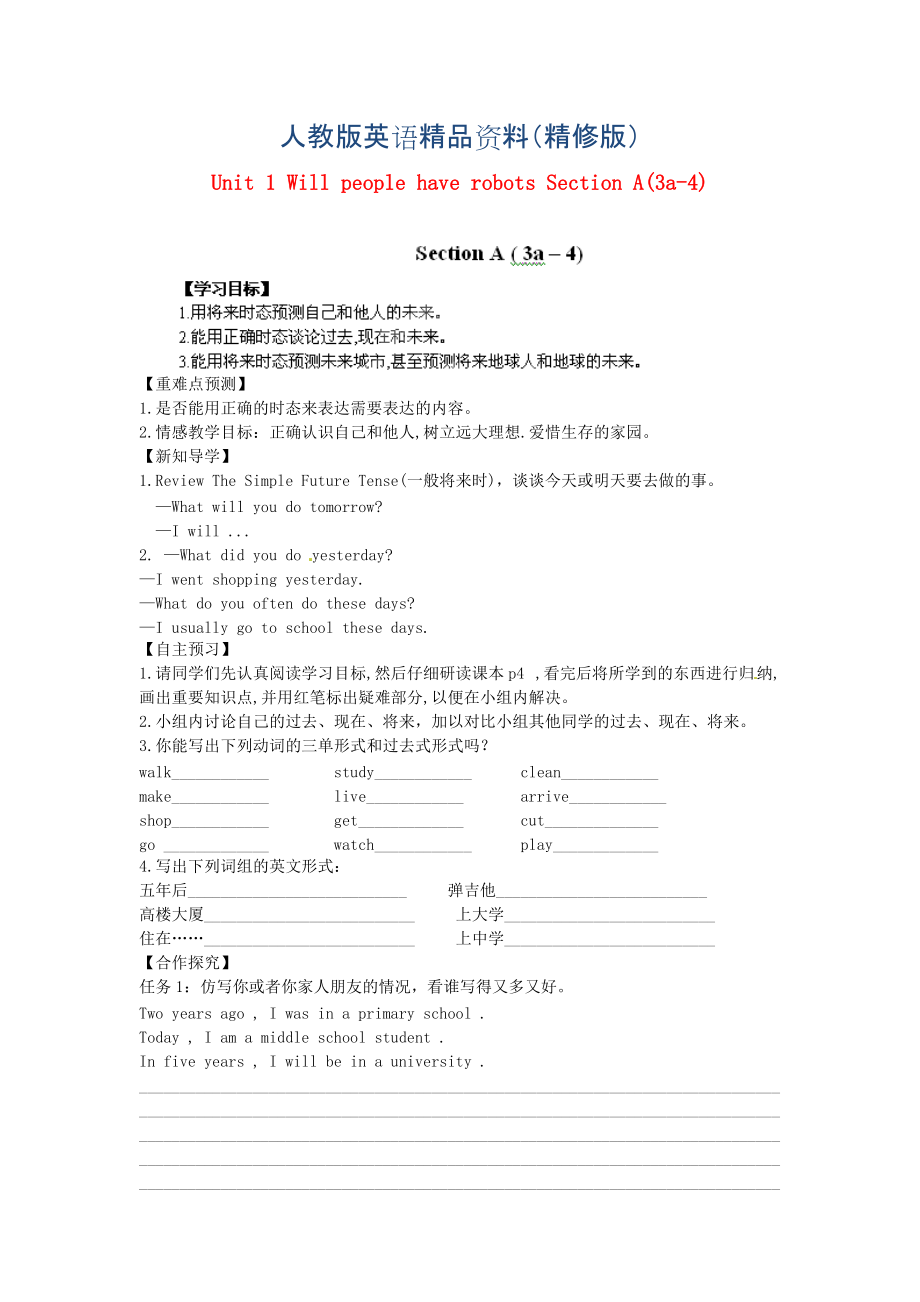《江西省八年級(jí)英語下冊(cè) Unit 1 Will people have robots Section A(3a4)導(dǎo)學(xué)案 人教新目標(biāo)版精修版》由會(huì)員分享��,可在線閱讀���,更多相關(guān)《江西省八年級(jí)英語下冊(cè) Unit 1 Will people have robots Section A(3a4)導(dǎo)學(xué)案 人教新目標(biāo)版精修版(3頁珍藏版)》請(qǐng)?jiān)谘b配圖網(wǎng)上搜索�����。
1�、人教版英語精品資料(精修版)
Unit 1 Will people have robots Section A(3a-4)
【重難點(diǎn)預(yù)測(cè)】
1.是否能用正確的時(shí)態(tài)來表達(dá)需要表達(dá)的內(nèi)容����。
2.情感教學(xué)目標(biāo):正確認(rèn)識(shí)自己和他人,樹立遠(yuǎn)大理想.愛惜生存的家園。
【新知導(dǎo)學(xué)】
1.Review The Simple Future Tense(一般將來時(shí))���,談?wù)劷裉旎蛎魈煲プ龅氖隆?
—What will you do tomorrow?
—I will ...
2. —What did you do yesterday?
—I went shopping yester
2��、day.
—What do you often do these days?
—I usually go to school these days.
【自主預(yù)習(xí)】
1.請(qǐng)同學(xué)們先認(rèn)真閱讀學(xué)習(xí)目標(biāo),然后仔細(xì)研讀課本p4 ,看完后將所學(xué)到的東西進(jìn)行歸納,畫出重要知識(shí)點(diǎn),并用紅筆標(biāo)出疑難部分,以便在小組內(nèi)解決���。
2.小組內(nèi)討論自己的過去、現(xiàn)在�、將來�,加以對(duì)比小組其他同學(xué)的過去�、現(xiàn)在、將來�。
3.你能寫出下列動(dòng)詞的三單形式和過去式形式嗎?
walk____________ study____________ clean____________
make_____
3��、_______ live____________ arrive____________
shop____________ get_____________ cut______________
go _____________ watch____________ play_____________
4.寫出下列詞組的英文形式:
五年后___________________________ 彈吉他__________________________
高樓大廈________________________
4��、__ 上大學(xué)__________________________
住在……__________________________ 上中學(xué)__________________________
【合作探究】
任務(wù)1:仿寫你或者你家人朋友的情況���,看誰寫得又多又好�。
Two years ago , I was in a primary school .
Today , I am a middle school student .
In five years , I will be in a university .
_____________________________
5��、____________________________________________________________________________________________________________________________________________________________________________________________________________________________________________________________________________________________________________
6��、_______________________________________________________________________________________________________________________________________________________________________________________________________________________________
任務(wù)2:假如你是個(gè)記者,請(qǐng)你去采訪一下你的組員,看看他們的情況是怎樣的,并記錄下他們的答案�����。
Name
Yesterday
Today
7�、Tomorrow
?
?
?
?
?
?
?
?
任務(wù)3:畫出你心中十年后的家鄉(xiāng)圖,然后再用文字把它描繪出來:
8、
考點(diǎn)聚焦
◆in 和 after
in后接過去一個(gè)時(shí)間點(diǎn)時(shí)����,用于一般過去時(shí)��。
China hosted the Olympic Games in 2008.中國(guó)在2008年舉辦了奧運(yùn)會(huì)��。
in后接一個(gè)時(shí)間段表示“。�。。后”或接將來的一個(gè)時(shí)間點(diǎn)時(shí)���,一般用于將來時(shí)���。
I will go to college in ten years.十年后我將上大學(xué)。
after后接一個(gè)時(shí)間段時(shí)����,用于過去時(shí)。
He began to play computer games after half an hour.半小時(shí)后他開始玩電子游戲�。
after后接一個(gè)時(shí)間點(diǎn)時(shí),可與將
9�、來時(shí)態(tài)連用。
We will go camping after 17:00.們將在下午五點(diǎn)鐘后去露營(yíng)�����。
注:提問“in+時(shí)間段”時(shí)用特殊疑問詞 how soon.
練一練:用in或after 填空
1. Mike will go back to London_______ a few days.
2. I’ll call you________ dinner tomorrow evening.
◆What do you think Sally will be in five years?
句中“do you think”通常被認(rèn)為是用作插入語���,意思是“你認(rèn)為”��,它后面的部分通常用
10�����、陳
述語序�����。插入語一般是對(duì)一句話作適當(dāng)?shù)母郊咏忉?����,如將其去掉�����,?duì)整個(gè)句子的意義來說����,
并無影響。如:
Who do you think is the best actor?
你認(rèn)為誰是最好的演員���?
練一練:選擇正確答案
( ) When do you think ______ his room?
A. will he clean B. he will clean C. does he clean D. he clean
【學(xué)案整理】
________________________________________________________________________________________________________________________________________________________________________________________________________________________________________________ Section A ( 3a – 4)
練一練:1.in 2.after
練一練:B
 江西省八年級(jí)英語下冊(cè) Unit 1 Will people have robots Section A(3a4)導(dǎo)學(xué)案 人教新目標(biāo)版精修版
江西省八年級(jí)英語下冊(cè) Unit 1 Will people have robots Section A(3a4)導(dǎo)學(xué)案 人教新目標(biāo)版精修版

